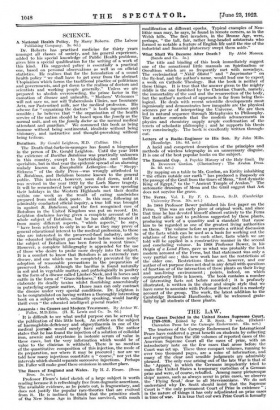Botulism. By Gerald Leighton, M.D. (Collins. 10s.) The Death-that-lurks-in-sausages has
found a biographer in the person of Dr. Gerald Leighton. Until the year 1918 the existence of Bacillus Botulinus was practically unknown in this country, except to bacteriologists and suchlike specialists, but in that year the epidemic spread of an alarming malady known as Encephalitis Lethargica—the " Sleepy- Sickness " of the daily Press—was wrongly attributed to B. Botulinus, and Botulism became known to the general public. This interest, however, soon died down, until it was revived in the year 1922 by the Loch Maree tragedy. It will be remembered how eight persons who were spending their holidays in the Western Highlands met their deaths within one week as the result of eating sandwiches prepared from wild duck paste. In this case, following an admirably conducted official inquiry, a true bill was brought in against B. Botulinus, and the first recognized case of Botulism in the United Kingdom was put on record. Dr. Leighton disclaims having given a complete account of the whole subject of Botulism, but he has skilfully treated it from many different aspects, " which aspects," he says, " have been referred to only in so far as they may prove of general educational interest to the medical profession, to those who are interested in the preserved-food industry, and to the educated intelligent general reader before whose notice the subject of Botulism has been forced in recent times." However, a complete bibliography is appended for the use of those who desire to probe more deeply into the subject. It is a comfort to know that Botulism is an extremely rare disease, and one which can be completely prevented by the adoption of reasonable precautions in the preparation of preserved foods. Although the bacillus is found naturally in soil and in vegetable matter, and pathologically in poultry in the form of a disease called Limber-Neck, and in horses and cattle in the form of " Grass-Sickness," the bacillus can only elaborate its deadly toxins whilst flourishing anaerobically in putrefying organic matter. Hence man can only contract the disease under very special conditions. Dr. Leighton is to be congratulated on having written a thoroughly interesting book on a subject which, ordinarily speaking, would hardly thrill even " the educated intelligent general reader."










































 Previous page
Previous page